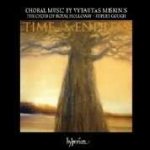By some very strange coincidence (or was it?) last November (2010) two recordings were released on the same day whose entire programs were devoted to the choral music of Lithuanian composer Vytautas Miškinis. The strangeness is due to the fact that although Miškinis (b. 1954) has been actively writing music and directing choirs for at least 30 years, and is quite well known and respected in his home country, until this moment his work has only occasionally shown up on recordings (at least those easily available to Western listeners). And when you hear this–and you must if you love choral music–you’ll wonder why it took so long.
One reason is the sheer fact of politics–the oppressive and artistically repressive 50 years of Soviet occupation; another is the obsession in the academic world during the 1960s and ’70s with serialism and atonality, anti-melody, and non-sung vocal sounds and extra-musical effects. However, recent years have seen a new wave of tonal choral writing where formerly extreme textural and harmonic signatures (yet maintained completely within a tonal framework) are used to forge a soundworld that both grows from and is uniquely expressive of the text. The virtual explosion of interest in and acceptance of this “new” style–which has come to define late-20th/early-21st century choral music–opens wide the door to composers such as Miškinis, who was writing music in this style long before Eric Whitacre or Morten Lauridsen came along.
When you hear the opening track, Dum medium silentium (from 2008), you will be both taken back to the basics of melody and harmony and struck anew by the expressive possibilities created from simple rhythms, fundamental intervals such as major seconds, harmonies expanded to more vivid effect by an added note or two, and of course the judicious use of note clusters (still in a tonal context), and sudden outbursts of dissonance, backed by primal, text-based rhythms. This is not just some pretty, commercial hash of lush harmonies and cute melody; this is a mature, masterful, and original piece of choral writing worthy of inclusion in the repertoire of any fine choir. Likewise the second work on the program, a setting of O sacrum convivium from 2000 that revels in vibrant harmony and full-bodied textures, the epitome of Miškinis’ more “accessible” writing, but nevertheless an embodiment of his personal and nobly guided obsession with illuminating the world and meaning of the text. In this regard, the Ave Maria II (one of at least seven settings Miškinis has undertaken) is among the more affecting, tender expressions of these words you’ll ever hear. In the Salve regina Miškinis creates an atmosphere that’s both otherworldly and mindful of the earthbound source of the prayer’s sentiments.
It would be easy to just go on and elaborate on the felicities and beauties and moving aspects of the disc’s other 14 pieces, but you should just go now and hear these for yourself. The Choir of Royal Holloway and its superb conductor Rupert Gough are ideal advocates for this music, the 35 mixed voices perfect in number and in quality and unity of ensemble. Only once or twice was there a noticeable intonation lapse (the ending of “O Rex gentium” in the set of Seven O Antiphons, for instance), and only once did I think perhaps the work at hand was a little long for its material (Oi šala, šala–from 1994). The sound, from St. Alban’s Church in London, perfectly complements the music and the choral timbres and textures. I recently reviewed the other Miškinis recording mentioned above (type Q13141 in Search Reviews) and am delighted to follow with this equally fine celebration of the work of a major, modern, and hopefully no longer little-known master of choral composition. [1/17/2011]
































